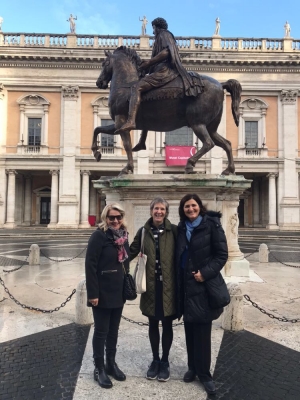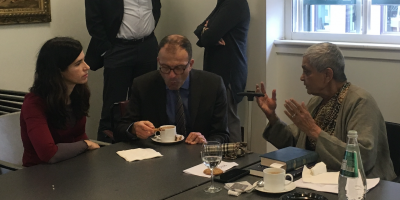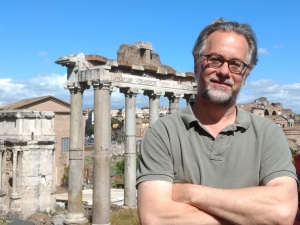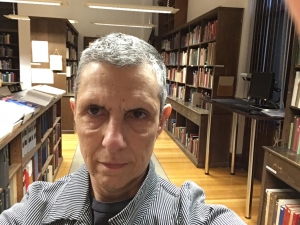Jed Atkins
"This past year, I reached a couple of significant professional milestones. First, I was awarded tenure. I am very grateful to have a job that I enjoy. I’ve enjoyed being a part of the department these past 8 years, and I am glad that my future will be here. Second, my second book, Roman Political Thought, was published in April by Cambridge University Press. Written to be accessible to students and non-specialists, the book provides an engaging guide to Roman political thought and its enduring legacies for modern liberal democracies. It’s available in paperback and reasonably priced, so it could be a good gift for a friend interested in the relationship between the ancient world and contemporary politics.
"I had a wonderful teaching load this year. In the fall, I taught a Latin seminar on Lucretius—one of my favorite authors ancient or modern—and also taught once again in the Visions of Freedom Focus cluster. This year my wife and children—3 and 5 at the time—came on our annual Focus field trip to Washington, D.C. My kids were excited to ride in their car seats in the large charter bus along with my students. In the spring, I taught the Latin literature graduate survey and a course on Roman political thought.
"This spring I had the privilege of visiting a number of wonderful institutions and cities to lecture. I gave talks at the “other” Durham across the pond, The Sorbonne and the University of Lille in France (Paris in the spring is indeed grand), and the University of Chicago and Wheaton College in Illinois. It was great to catch up with Alex Loney at Wheaton, who overlapped with me during my first two years at Duke as he finished his Ph.D. and then taught for our department."
Tolly Boatwright
"I’ve had a glorious sabbatical leave working on Imperial Women of Rome: Power, Gender, Context. Duke’s fine library resources have allowed me to move forward, and I’ve had the boost of presenting two related talks. In November I went to Rome for a conference at the Musei Capitolini celebrating the wonderful exhibit on Trajan at the Markets of Trajan. The Trajan exhibit, Traiano. Costruire l’impero, creare l’Europa, will be open until mid-September, 2018; well worth a visit, it is provocatively curated and offers an amazing collection of material, including some created by Maurizio Forte and his team at Duke. I presented “La presenza a Roma delle donne imperiali, fino a Sabina,” in the intriguing conference “Le donne nell’età dell’equilibrio: first ladies al tempo di Traiano e Adriano.” My leave allowed me a few weeks in Rome exploring its northeastern section (think of the train station and Santa Maria Maggiore), mostly residential in antiquity but the location of many elusive monuments associated with the imperial women. In April I gave a talk from a different chapter. “Above the Law? Crimes and Punishments of Imperial Women,” which I presented at the Biggs Family Residency in Classics Reunion at Washington University in St. Louis, was exciting stuff, albeit disheartening if one ever envied the life of a Roman empress. I haven’t neglected Hadrian, however: I wrote “Hadrian in Syria and the East” for the planned The Oxford Handbook of Ancient Syria and the Near East. My 2017-18 leave also enabled travel for general research and classics. As the faculty liaison for a Duke Alumni cruise along the Danube in late August and early September, I became better acquainted with Trajan, other Romans, and non-Romans there: besides revisiting Carnuntum, I finally saw the Iron Gates! I made it to the Boston SCS in snowy January, to apprentice for my upcoming presidential duties. In April a quick trip took me to Chicago for an Intercollegiate Center for Classical Studies’ reunion focusing on the antiquities at the Art Institute of Chicago and on the “Ancient Mediterranean Cultures in Contact” exhibit at the Field Museum (to which Maurizio contributed). Both venues were wonderful, as was my dinner with our alum Will Nifong (BA, 1989) and our emeritus colleague John Clum (English and Theater Studies). Later in April in New York City for a SCS gig I literally ran into John Broadbent (BA, 2014) in Penn Station: he’s flourishing, and will be in law school come August. I am looking forward to teaching again, and to hearing how all of you are doing."
Claire Catenaccio
"My first year at Duke has been a triumphant success! I’ve had a wonderful time getting to know my colleagues and students. In the fall I taught two classes: a graduate seminar on Aeschylus’ Eumenides and Euripides’ Orestes, which included a class trip to Paperhand Puppet Intervention in Saxapahaw; and an intermediate language course on Plato’s Symposium, which culminated in our own (wineless) symposium, with me in the role of the know-it-all doctor Eryximachus. In the spring my two classes united for a three-day excursion to New York City, where we saw a performance of Aristophanes’ Frogs in the original Ancient Greek, staged by the Barnard/Columbia Ancient Drama Club, and visited the Metropolitan Museum of Art. In my own research, I’m forging ahead on my book manuscript on monody (solo actors’ song) in Euripides, as well as completing an article on Greek tragedy and Lucretius."
Gregson Davis
"The highlight of last year’s professional life for me was the actual appearance in print of my English translation of the long prose-poem by the Martinican writer, Aimé Césaire: Cahier d’un retour au pays natal (mentioned as forthcoming with Duke University Press in the previous edition of PHEME). Sad to say, my Nigerian collaborator, Professor Abiola Irele, who had contributed an updated version of his commentary on the French text to our new bilingual edition, died suddenly just a few weeks before the book emerged in luminis oras (“onto the shores of light”) -- to quote a favorite phrase of Lucretius. Later in the Spring, I had the great pleasure (and honor) of delivering the Clack invited lecture at the annual CAAS meeting held in NYC., where I spoke on the reception of Lucretius’ De Rerum Natura in Césaire’s lyric oeuvre, with special reference to the Cahier. The specially convened panel on the general topic of Classical reception in Caribbean literature that followed my presentation included a contribution by our recently retired colleague, Peter Burian, who elaborated on the theme of the reception of Homeric epic in Derek Walcott’s Omeros. A welcome Dean’s leave offered me the opportunity to pursue research on the “Tithonos” fragment of Sappho (in consultation with Dirk Obbink at Oxford), as well as on architectural monuments in early Imperial Rome (as a visiting scholar at the American Academy) -- the latter project having been stimulated by recent controversies at various American universities (including Duke) over the removal of monuments to American Civil War confederate leaders.
"While in Rome I was fortunate to be able to view the state-of-the-art visual reconstruction of the "Forum of Trajan" made especially for a current exhibit on the emperor's reign by none other than our colleague, Professor Maurizio Forte."
Maurizio Forte
Maurizio Forte will continue the archaeological excavation in the Etruscan and Roman site of Vulci (10th cent. BCE, 5th cent. CE), in Italy, with an international team of 35 people involving undergrad, grad students and faculty from 15 different universities and 6 countries (sponsored by Duke Bass Connections, A&S grant and Fondazione Rovati).
This will be the third year of excavation in the area of the Roman Forum and it will concern the exploration of an Etruscan well-cistern and of the deepest layers related to the origins of the Etruscan city-State.
Technologies will play an important role: ground penetrating radars, wings multispectral drones, laser scanners, digital photogrammetry, virtual reality, augmented reality, will record data in real time for producing the highest level of accuracy and digital standards.
Thanks to a new collaboration with the Pratt School of Engineering, robots will be used for the firsttime in an archaeological excavation. The excavation will host also a new international fieldwork school for undergrad students which will learn how to deal with a so high-tech equipment in an integrated operational workflow. Duke is the first and only university with a 3 years permit for the excavation of the urban site.
Kyle Jazwa
"I very much enjoyed my first year at Duke teaching Greek archaeology and Classical Studies courses. The students’ enthusiasm, intelligence, and creativity consistently impressed me. Here are a few of the highlights: In “Ancient Science and Technology”, the students researched and recreated a variety of ancient technologies, such as wool spinning, ballistae (plural!) launching, and papyrus making. Several students in the “Ancient Athletes” course followed a similar tact and made 3D-printed halteres for an in-class long jump display. We also followed the Winter Olympics with great interest and reflected on the relationship between ancient and modern sporting culture. I also enjoyed leading an “Early Greek Archaeology” courses in each semester. In these, we explored many compelling questions and themes concerning the socio-political structures, ritual, warfare, and population movement during the Early Iron Age in Greece.
"In addition to teaching, I had the pleasure to work with Saumya Sao, the undergraduate Classics Club, Jill Wuenschel, and William Johnson to help with the organization of the first Duke Classics Certamen at Duke University. Everyone’s hard work paid off with a wonderfully successful event that brought dozens of high school students to campus to compete over Classics trivia!
"This was also a very productive year for research. I managed to finish several articles, and I presented papers at three international conferences on topics of ancient architecture and construction, Classics outreach, and the application of settlement ecology models to complex societies in the Mediterranean.
"I look forward to continuing my research this summer with a lengthy slate of field work in Greece and Cyprus. After excavating in the Kopais basin (Greece), I will adopt the role of peregrine researcher to study architectural materials from several ongoing and (long) past excavations. In Ancient Corinth, for example, I will complete a study of the Early Bronze Age roofing tiles – the earliest in the world! – from Zygouries that were excavated in 1921 by the legendary archaeologist, Carl Blegen. A grant from the Mediterranean Archaeological Trust will facilitate this research and analysis. In early August, I will also lead a small team (including Duke Ph.D. student, Tony LoPiano) to Cyprus. We are very excited to spend ten days at Maa-Palaeokastro (near Paphos) documenting the construction of the site’s domestic architecture. Maa was founded during a period of tumult and crisis at the transition from the Bronze Age to the Iron Age. By comparing the identified building traditions with indigenous Cypriot and outside (esp. Greek) architecture, we hope to offer a new perspective to questions of local identity and population movement."
Alicia Jimenez
"After my third year re-appointment I enjoyed a junior sabbatical in the Academic Year 2017-2018. I had the great privilege of being granted a fellowship at Columbia University Italian Academy for Advanced Studies in America, to work on my second book project on the relationship between mimesis, colonialism and material culture in the Roman Empire during the fall semester of 2017. The manuscript examines new theoretical approaches to an “archaeology of the double”, using different case studies in which the simulacrum reveals more than meets the eye: the copies of different elements from the Forum of Augustus in provincial capitals, replicas of the dead, and mass-produced commodities that contributed to the dissemination of gender stereotypes. During my time at the Academy I concentrated on the more interdisciplinary and theoretical parts of the book, the two chapters that deal with questions about how a standard is created, the meaning of “ubiquity” in cultural terms, and the processes unleashed when a society is flooded with a type of object that’s easily recognizable.
"The interaction with the fellows and scholars during my stay has had a deep influence on the way I structured the book and approached several key problems in the first draft. Particularly important for the project were my conversations with David Freedberg (Columbia) about the nature of mimesis and material culture, Francesco de Angelis (Columbia) on the replicas of the Forum of Augustus in the provinces, Gayatri Spivak (Columbia) in relation to the question of representation and the subaltern during my talk at the Academy weekly seminar series, Severin Fowles (Barnard) about the vexed issue of the relationship between things and people in (post)colonial contexts, Rosalind Morris (Columbia) on the power of the fetish and the replica, and Michael Taussig (Columbia) on the anthropology of mimetic practices. During mystay in New York I gave two papers, one at the Italian Academy, in which Gayatri Spivak and Francesco de Angelis acted as discussants, and one at the Department of Art History and Archaeology at Columbia University. In January of 2018 I traveled to Paris, France, for a 6-month stay at The ANHIMA Research Center (UMR 8210, Anthropologie et Histoire des Mondes Antiques, CNRS-EHESS-EPHE-Paris 1-Paris 7), where I really enjoyed having access to several world-class research libraries and the chance to discuss with Michel Redde (ANHIMA) different questions about Duke’s project at the Roman camps at Renieblas (Spain) and the Roman army. Our season at the site in the summer of 2017 was particularly productive. We recovered important new evidence: imported pottery, metal artifacts, as well as organic material, which provided the first dates at the camps obtained by radiocarbon analysis. All this new evidence will be crucial to add novel insights about the life at the camps and advancing a chronology for the site based on archaeological information. We are very grateful to the Loeb and the Trent Foundations for supporting our research at the site and to the Department of Classical Studies, which funded through the Quigley Endowment the travel expenses to Renieblas of Duke’s undergraduate Lauren Pederson, who joined our team for the second consecutive year."
William Johnson
"I rotated in as Chair in July 2017, right before our external review, and we faculty have been busy bees this year as we work through a variety of curricular and programmatic discussions and revisions. That too has its rewards, though I find myself looking wistfully at my compeers as they pursue the full activities of the teaching and research life.
"Fortunately, there was much in the research pipeline, and I have somehow managed to keep various future projects afloat as well. Last October a major project (43 chapters, 776 pages) on the Second Sophistic finally came to fruition in the Oxford Handbook series, after five long years of work. That book, which I co-edited with D. Richter of the University of Southern California, is foundational for those who need grounding in the literature, society, and culture of the second century in Greece and Rome, an urgent need in our field.
"In the past two years I also published four articles on ten previously-unpublished papyri in the Yale collection. Nine of these papyri are from the abdominal cavity of a mummified animal, all Ptolemaic (2nd century BC), which makes them rare, and there are a couple of literary pieces, including a fragment of comedy and one fragment of exceptional interest that suggests a commentary activity unlike any previously known from antiquity. The literary and para-literary pieces came out last year, and this winter the third installment, six documentary texts of varied content, was published in the Zeitschrift für Papyrusforschung. This publication was a heavy lift, as the kids say, since it took me far from my deep expertise in literary papyri and required trekking a long path of unfamiliar details relating to Ptolemaic bureaucracy and society. Along the way, I also determined that one of the papyri assigned in the Yale catalogue to this group was miscatalogued. That papyrus is in fact not mummy cartonnage, but is rather a personal letter from one female to another, dating to the 1st century AD. That too was published in January by Zeitschrift für Papyrusforschung.
"Published in September 2017 was a quite different piece, an article on ancient pantomime, that explores an interesting comparandum from Japanese dance drama. The article, which is entitled “Imperial Pantomime and Satoshi Miyagi’s Medea,” came out in the journal Didaskalia; you can check out the online version at http://didaskalia.net/issues/13/13/.
"As for what I’m working on now, you can find out about that by reading the article in the homonymous series of Duke Today (April 2018)."
Joshua Sosin
"This has been a fun and exciting year, particularly in the classroom. In the Fall I taught a graduate seminar on social and legal status in fourth-century Athens. Sort of. Really, it was a seminar in how to build ideas. The content was the vehicle and excuse. The students just killed it; the number of good research ideas that emerged from discussion (and the ten short papers that students wrote) was impressive. In the Spring I taught Athenian Law to a full house of undergraduates, a third of them veterans of Greek History, which was a real delight. The chance to see students grow and mature from one class to the next is a real joy of the job. And the gusto with which students dove into a difficult and technical subject was something to see. They got it. One wrote in an evaluation, “This course is how college classes should be. There is limited importance placed on grades and the intensity of the course is focused on discussion and deliberation of texts.” And another, "I do all the readings thoroughly, overprepare for the discussions, and feel very well equipped for each class discussion as a result. But, despite the lack of stress about grades here, I still feel like I am learning a tremendous amount—an ideal combination if you ask me." Hard work, low stress, high impact. That's the goal!
"That was also the model (plus high heat) for the Spring Breakthrough course that I taught during spring break. In just 4 days, students worked with a world-renowned framebuilder to fabricate a lugged steel frame from scratch (yes, melting metal with a torch) and then with a master mechanic to build up the complete, functional, and beautiful bike. When we weren't in the shop, the students had a chance to learn about the social, cultural, economic, and technological history of the bicycle and cyclists. We are now auctioning off the bike and will use the proceeds to acquire bikes for Durham children. You can see a video made in support of the auction here: https://www.youtube.com/watch?v=EQpsLmWFY04&feature=youtu.be. This was a super experience, the kind of thing Duke does so well.
"This was also my first year as DGS. You don't realize just how much effort goes into a position like this till you do it. To its credit and the benefit of us all Duke has been approaching graduate advising with more rigor, care, and support in recent years. As a result of that and owing to my service as DGS, my thinking about how we prepare our PhDs and what we prepare them for has really grown in this past year alone. You can see a small bit of that in a piece that I wrote for the Versatile Humanists blog: https://sites.duke.edu/versatilehumanists/2018/05/14/strategic-disserta….
"This year's bike tour will run solo Durham to Roanoke, then up the Washington and Jefferson National Forests, and then family-style Cumberland&Harpers Ferry&Cumberland. In preparation, Tomás has started eating meat again and I, well, I haven't really prepared."
Clare Woods
"This has been my second busy year as Director of the Thompson Writing Program. The TWP will be expanding soon into an adjacent building on East Campus. We're also excited to be working with the Graduate School to expand Writing Studio offerings to graduate students in the near future. I've also enjoyed a third year co-directing Story Lab with Eileen Chow and Carlos Rojas (both from AMES), and with Duke alumna Sabrina McCutchan as our office manager. We hosted workshops (e.g. on zine making) taught classes in the Lab, convened a reading group to discuss Emily Wilson's new translation of the Odyssey, and continued our popular Scholars and Storytelling lunchtime talk series. Since this was our final year of funding from the FHI, we ended the year with an all-night Story Con. The festivities included a keynote from Mona Eltahawy, an all-night performance by Poetry Fox, live poetry slams, panels, tabletop gaming, food trucks and more. Story Lab looks set to continue life in a new West Campus venue and in collaboration with a new Game Lab, so watch this space! My own digital project, Carolingian Intellectual Networks, continues to grow with one article almost ready to go, and a second in the pipeline. I presented a talk titled "Mapping Exegesis in the Carolingian World" this Spring to the Digital Matters conference at Duke. Later this year, I will present on further aspects of the project at the Society of Biblical Literature annual meeting in Denver in November, and at December's The Connected Past conference in Oxford. A new project working on annotated early printed copies of Pliny the Elder's Natural History is also in the works. I hope to present on that at the Society for Classical Studies meeting in January 2019. My teaching load this year has been lighter, but I enjoyed reprising my graduate seminar on Carolingian Culture in Fall 2017. In addition to reading some of the ninth century's best textual offerings, I structured assignments to build towards a mini conference. Students practiced and workshopped conference proposals, received feedback on an early draft of their paper, and delivered a "lightening talk" version of it in a final class session."
Faculty Emeriti
Carla Antonaccio
"On June 30, 2018, I will become professor emerita at Duke. Many factors have led to my decision to resign my position, most of them personal. I have been fortunate to spend my 30 years of teaching at two excellent universities - Wesleyan and Duke. What made the difference in my decision to leave the former and come to the latter was the sense of possibility that a major research university presented, as evidenced in the excellent friends among colleagues at both Duke and UNC, the facilities and students, and the support of more than one administration for the expansion of archaeology at Duke.
"I will continue to work on publishing Morgantina and cleaning up some other publication obligations, as well as working with the remaining graduate students who are writing their dissertations with my involvement. To all the students and colleagues whom I have been privileged to teach and work with, my thanks and my best wishes."
Francis Newton
"Since the 2013 article on the 8th-century "Lindisfarne" Gospels (jointly with my son Francis Jr. and my former student, Christopher Scheirer), I have continued to study the palaeography of Insular Gospel Books, and their colophons (where present). The discovery of some fragments, in the archives of the Teutonic Knights in Berlin --a discovery made by the late Hartmut Hoffmann of Goettingen and generously turned over to us, of a Latin gospel book in Insular majuscule similar to the script of the Book of Kells,' in *An Insular Odyssey. Manuscript Culture in Early Christian Ireland and Beyond,* ed. Rachel Moss, Felicity O'Mahony, and Jane Maxwell, Dublin, 2017, pp. 249-259. The Comité internationale de Paléographie Latine met for the first time in this country, at Yale, in September 2017, and I was able to see many colleagues on that occasion, as well as renew acquaiintance with some key manuscripts in the Beinecke Library. As of June 1st, my article --first presented in a conference at Harvard in Dec. 2016-- on the date and place of the sensational music manuscript, Monte Cassino 318 (Monte Cassino, last quarter of the eleventh century), has come out in the facsimile volume, *Monte Cassino, Archivio dell'Abbazia 318,* ed. Prof. Nicola Tangari and Don Mariano Dell'Omo, 2018. I send best wishes to all our former students and colleagues."




